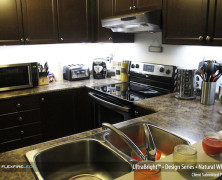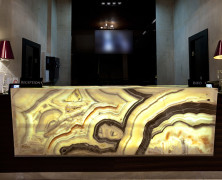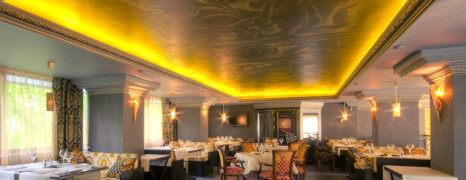“There is too much light in this kitchen,” said no one ever. Many homeowners have found that adding more kitchen lighting dramatically improves their ability to prepare meals and enjoy time in the kitchen, a room that is often referred to as the heart of the household. Just as there are many ways to bake a cake, there are many ways to improve kitchen lighting with LEDs. In this post, we will walk you through a few popular options for improving kitchen lighting using LED strip lights. Under Cabinet Lighting Probably the most common application of LED strips in the kitchen is under cabinet lighting. With Flexfire LEDs strip lights, adding attractive task lighting is as easy as one-two-three. Start by peeling off the paper backing. Then attach the highly adherent adhesive to the bottom of your kitchen cabinets. Finally, plug them into a power source and voila, we’ve got light! It’s nearly that easy, but of course if you have questions about installing under cabinet lighting (such as what kind of power supply you will need or how to install a dimmer), our on-call design specialists would love to lend a helping hand. For this sort of installation, we generally suggest our UltraBright™ Architectural series, which comes in three different color temperatures of white — warm, natural and bright. Also, consider installing an LED dimmer for further user control. Above Cabinet LED Lighting Above cabinet lighting is an incredible solution for those who love the healthy, generous glow and sleek look of indirect lighting designs. Attach versatile, discreet LED strip lights to the top of any cabinet to provide a beautiful indirect light source without any visible wires or components. Adding high quality, indirect light will bring the kitchen to life; it’s a look favored by top kitchen lighting...
Granite, Marble, and Onyx Backlighting With LED Strip Lights...
posted by Flexfire LEDs
Translucent backlighting is a powerful tool for designers who want to create artistic, tasteful indoor environments. High quality bright lighting is key to achieving this look, and Flexfire LEDs strip lights definitely fit the bill. Using our strips to backlight onyx, granite, or marble panels maximizes the visual impact of these attractive materials in decorative wall panels, countertops, reception desks, floors and more. To create granite, marble, or onyx backlighting, we suggest using LED strip lights that are evenly spaced behind the material to create an even, bright glow. Our strip lights are the brightest available on the market today, which is a good thing if you want people to notice your installation. While many people use a professional contractor to perform this installation, it can certainly be done as a do-it-yourself project. Let’s look at some of the key factors to consider if you want this look in your home or business. First, LED strip lights run cooler than CFLs, and will be much safer to operate. Adding an aluminum heat sink will help the strips run even more efficiently, adding energy and cost savings to the list of benefits. LED strip lights are also smaller than CFLs, allowing more freedom to realize your design vision. Finally, LED strips can be cut, curved, and connected to fit any dimensions you have with little or no difficulty. When backlighting translucent materials, the idea is to make it appear as though the sun is shining through them. Many will claim that you need to buy expensive, custom-made LED modules to achieve this look. You are certainly free to do so, but our affordable strip lights will work perfectly as they can diffuse the light and create an even glow. Reliability is of course another important...
Integrated Daylight Harvesting With LEDs...
posted by Flexfire LEDs
It seems every day the LED industry is crossing new boundaries, reaching new thresholds, and brightening an expanding horizon. Adding one more reason for optimism, we’d like to share news about the latest developments in integrated daylight harvesting with LEDs. Integrated LED/daylight systems use sensors to assess how much natural light is entering a room, adjusting the LED system accordingly to reach a desired light level. Basically, these integrated lighting systems improve indoor lighting systems by optimizing artificial light in combination with natural light. The benefit of this system is that it significantly reduces business and consumer energy consumption costs, while greatly improving quality and functionality over conventional lighting set-ups. On their own, high quality LED lights already produce light 80% more efficiently than incandescents. Conventional incandescents actually waste 80% of the energy they require by producing heat rather than light. On this basis alone, it’s clear that LEDs present a huge opportunity for energy savings. With electricity production as the single largest contributor to CO2 emissions, accounting for 38% of U.S. emissions from 1990-2012, the reduction in usage afforded by LED lighting has an enormous environmental impact. But by using natural lights when possible, capitalizing on integrated daylight harvesting with LEDs, the already astonishing energy savings of this revolutionary lighting technology are even greater. Intelligent controls represent one of the greatest advancements brought to us by LED lighting systems. Through digital programming and networked management, LED lighting systems can easily be adjusted to meet predetermined factors. LEDs are superior to CFLs for networked management because they can be turned off and on easier, and can also be finely adjusted. Not only that, but the quality of light produced by many LEDs is actually closer to sunlight than most CFLs, which is another reason people are turning...
4 Ways To Create Ambient Light With LED Strips
posted by Flexfire LEDs
Ambient light is defined as the general illumination within a space. The availability of ambient light throughout the home is one of the most critical considerations in interior design. With LED strip lights, there are many more ways to effectively create ambient light to brighten the home for family and guests. Strip lights capitalize on the well-known benefits of LED technology – providing ample, beautiful light with low energy costs and incredible durability. But there is another important factor exclusive to strip lights, and that is their supreme design versatility. Our strips can be cut, curved and connected to fit any space and shine light exactly where you want it. Here are four ways to create attractive ambient light with LED strips: Indirect Light One of the best uses for LED strip lights is in indirect lighting projects. Indirect lighting is a great way to add focus, texture, layering and accent color to rooms throughout the house. Many people choose to run the strips above cabinets in the kitchen, behind mirrors in the bathroom, or in coves through hallways. Modern designers have expressed a preference for indirect lighting because of the way it hides fixtures and because it produces an evenly distributed glow of ambient light throughout the room. Pro Tip: Take extra care to make sure the high energy areas of your house have ample lighting. Where does the family gather? In the kitchen or the living room? Make sure that the lights you install are bright enough to energize a crowd, making everyone feel lively and excited to be together. Our LED strips are some of the very brightest LEDs you will find on the market. Task Lighting Ambient light in a room is not only measured by how attractive it is, but also by its functionality. One advantage of LED strips is that their versatility makes them great for task lighting installations. LED strip lights are perhaps the best solution there is for under cabinet lighting — a common example of home-based task lighting. Further, this is a simple DIY project that won’t require a huge electrician expense. To add kitchen task lighting, just peel back the adhesive on the back of our strips, stick them under the cabinet and connect them to a power source for incredible kitchen task lighting. Pro Tip: When installing task lighting, it’s a good idea to put in more light than you think you’ll need. First, these lights will last many years into the future, and who couldn’t use more light as the years go on? Second, when you’re focusing on a task, more light means better concentration and improved accuracy. Dimmers Dimmers are important for creating the right ambient light atmosphere in the home. With dimmers, you can turn down the lights as night falls, which will relax your mind and bring you closer to sleep. Dimmers can also be used to add light to a room where natural light normally enters, but perhaps clouds are letting in less light than normal and you need a little extra. With a dimmed LED strip lights, you will have full control to add the perfect level of light necessary for any given situation. Pro tip: Before you add a dimmable LED strip lighting system, it is a good idea to consider whether you want a hardwired wall dimmer or a remote inline dimmer. The latter option is easier if you have a professional electrician on hand, while the second option can be done as part of a DIY installation. Accent Light LED strip lights can also improve a room’s ambient light by adding accent. Running strips along toe kickers or under counters is a great way to add color or textures to a room. With LED strips, the possibilities are only limited by your imagination. If you’re looking to add an extra creative flair, add color-changing RGBs and harness the power of color psychology. For instance, say...
Program LED Strip Lights To Save Money...
posted by Flexfire LEDs
Installing LED lights in your business, warehouse or home is the first step toward realizing a dramatically lower lighting bill. The next step is to program LED strip lights to connect with occupancy sensors, timers and smart controls to maximize the greatest savings possible. As demand for green technology and efficient use of resources continues to grow, networked LED lights have become a crucial component in the modern energy retrofit. Energy efficiency investments could total $959 billion from 2014 to 2023, according to forecasts by Navigant Research. One thing is for sure: when it comes to effective ways to save energy on your lighting bill, LED-based lighting systems are impossible to beat. To start with, LEDs are incredibly efficient. Thomas Edison’s incandescent lightbulb, which brought electric light to the 20th century, produces just 16 lumens per watt. In comparison, most commercially available LEDs produce anywhere from 60 to 100 lumens per watt. But the efficiency of LED technology doesn’t end at the diode; its ultimate energy-saving superiority lies in its advanced control capabilities. Using LED-based automated systems, lights can be programmed to turn on and off automatically when people enter a room. Further, dimming and other advanced features can be controlled externally via smartphones or software connected to the internet. This networked management is possible because LEDs can be switched off and on digitally, and can easily be finely adjusted for both brightness and color temperature. Highly advanced LED-based lights can even be tuned to correspond to natural sunlight entering the room in a method of lighting known as daylight harvesting. Advanced daylight harvesting uses sunlight entering a room from windows and skylights and adjusts the LED lighting system to automatically add the necessary light to meet the room’s predetermined brightness level. Changing to LED lighting...










